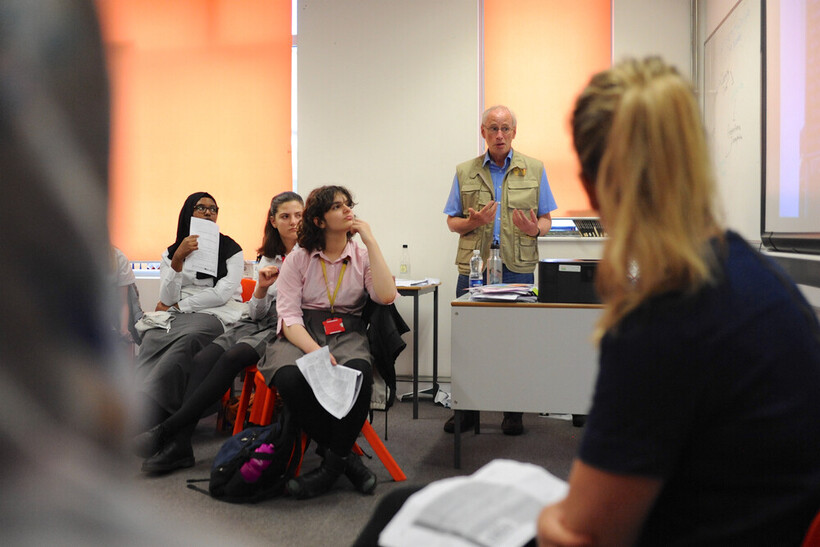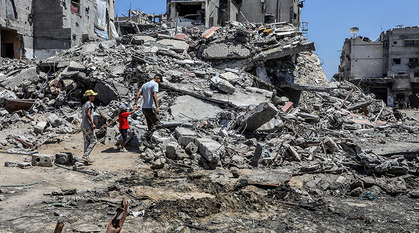What next for Ofsted?
Ellis Brooks takes a look at whether the school inspection regime in England helps promote positive peace in schools.

In the peace education team, we've been following the passionate debate about Ofsted, the school inspections agency in England. Following an incident where a headteacher took her own life after a negative Ofsted inspection, the BBC reported that "the dam has burst on strength of feeling" about the agency. Former schools minister, Jim Knight, has now been asked by the National Education Union to chair the Beyond Ofsted inquiry to develop an alternative approach to inspection.
Quaker Values in Education (QVinE), a Quaker Recognised Body with an interest in education, have a longstanding concern that "current assessment and inspection arrangements are both inadequate and excessive". They have a vision for their transformation, believing that "inspection regimes should be humane, nurturing and recognise a breadth of disciplinary and other experience necessary for the realisation of full human potential".
A debate delayed
It's been an open secret that Ofsted inspections can cause stress and distress beyond what is reasonable for some people working in schools. We hear about the issue from many teachers and headteachers. 'Failing' an Ofsted can lead to forced changes in leadership, academisation and drops in enrolment, which leads to budget cuts.
One head told us she would not actually want an Outstanding judgement because it would create an unrealistic expectation next time. There's clearly a lot of pressure.
The intention to improve schools is good; we should all care about the best way to promote equality, safety and wellbeing for all. But are the tools and systems being used fair and effective?
Positive peace in schools
Quakers' focus on peace leads us to try to understand peace in schools using Johan Galtung's model of 'positive peace'. Schools should not only be free of overt violence but fair and inclusive communities. In their book Positive Peace in Schools, Hilary Cremin and Terence Bevington suggest this can be achieved through an intentional combination of peacekeeping, peacemaking and peacebuilding – does Ofsted contribute to this?
Ofsted inspectors seem to be blown away when they meet children and young people ready to be peacemakers. It can make it easier to make the case to other schools when Ofsted praises peace education initiatives like peer mediation, which lots of schools use for conflict resolution.
[QUOTE-START]
Pupils act as peer mediators to help pupils to find ways to solve their disagreements, by talking and finding a solution without having to get an adult to sort it out for them. This is helping to improve pupils' independence and resilience.
- Ofsted
[QUOTE-END]
We also draw on aspects of the Ofsted framework, like the section on Spiritual, Moral, Social and Cultural development (SMSC) which provides space for much needed peacebuilding in schools. Learning for Peace, a great resource from Peacemakers, is tied to the SMSC criteria.
A relational approach
With limited resources, schools are responsible for promoting children's mental and physical health, challenging discrimination, staying alert to child abuse or exploitation, countering bullying, mitigating the impact of social inequality and helping young people grapple with climate anxiety. Plus, they are expected to get pupils their grades!
Does Ofsted make it easier for schools to address these challenges? We have criticised Ofsted when we thought guidance was counterproductive, warning against overemphasis on peacekeeping at the expense of restorative practice. We see so many examples of peacebuilding in schools, as we've reported on in Peace at the heart: a relational approach in British schools. Sometimes Ofsted praises these same things; sometimes it seems to miss them. The Ofsted framework could do more to help schools affirm and cultivate a relational approach.
There are other acute problems. Parents and students at the Army Foundation College (AFC) in Harrogate have raised the alarm about endemic violent behaviour and abuse by staff. Ofsted still describes the AFC as Outstanding.
Ofsted and inequality
In a nation with so much inequality, where does Ofsted fit in? Some schools get 'stuck' once they receive a judgement of Requires Improvement or Inadequate, trapped in a cycle of challenges making it hard to turn around, exacerbated by the resource cuts schools have endured over the last decade.
Does Ofsted contribute to this spiral or does it merely report the disparity? Child welfare researcher Calum Webb identifies links between positive Ofsted ratings, lower poverty and higher spending on early help and family support.
Research shows the more deprived a local authority is, the less likely they are to receive a Good or Outstanding judgement. Further research found "no detectable difference" between schools Ofsted describes as Good, Requires Improvement and Inadequate.
Peace at the heart of education
As Quakers, we are concerned about how the current systems affect peacebuilding in schools. Our belief in that of God in everyone holds true for our work in education. This is why we believe in education that cultivates wellbeing and supportive peer relationships, where the whole person can be affirmed. This is our vision in Peace at the heart. We will continue to work for its realisation and hope that in all our work, and Quaker communities, we can bear witness to the pain experienced by people in schools and provide them with oceans of support.


